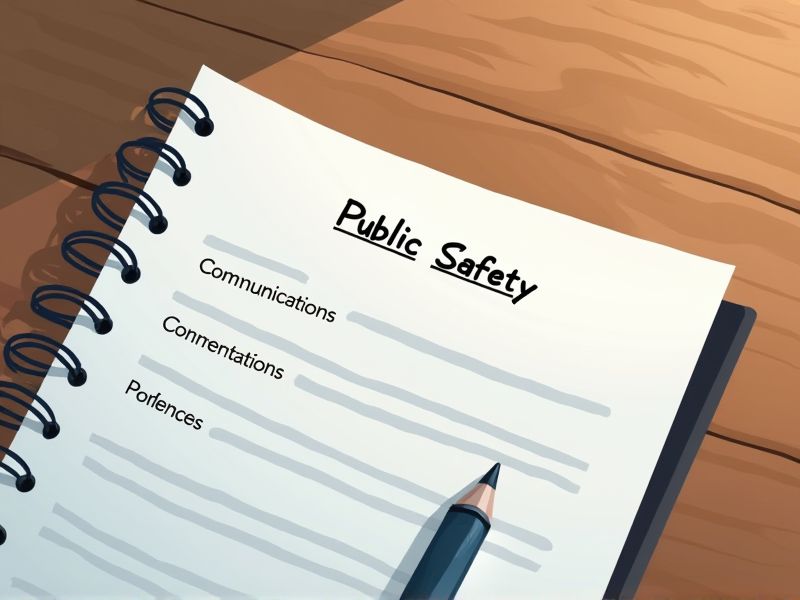
Public safety communications officers play a critical role in emergency response, requiring them to manage high-stress situations effectively. Certain certifications ensure they possess the necessary skills and knowledge to handle diverse challenges, such as understanding advanced communication systems and crisis management techniques. These certifications validate their proficiency and ability to make rapid, informed decisions, which can significantly impact public safety outcomes. Here are some important certifications you may need as a Public Safety Communications Officer.
APCO Certified Public Safety Telecommunicator (CPST)
The APCO Certified Public Safety Telecommunicator (CPST) certification ensures telecommunicators have standardized skills essential for handling emergency calls effectively. Having this certification in place enhances the accuracy and efficiency of communication, which is vital during critical incidents. It serves as a benchmark for agencies to maintain a high level of competency among their staff. Certification offers reassurance to the public and contributes to a more reliable emergency response system.
FCC General Radiotelephone Operator License (GROL)
The FCC General Radiotelephone Operator License (GROL) is essential for a Public Safety Communications Officer to legally operate and maintain radio transmitters that are integral for emergency communication systems. This requirement ensures that personnel have the technical expertise required to handle critical communication equipment, which significantly reduces system downtimes during emergencies. Holding a GROL demonstrates compliance with federal regulations, promoting standardized practices and effective communication across state and local agencies. Having qualified operators mitigates potential risks and enhances public safety by ensuring reliable and efficient communication channels are maintained.
Emergency Medical Dispatcher (EMD) Certification
Emergency Medical Dispatcher (EMD) Certification ensures that public safety communications officers can effectively assess emergency situations through precise questioning, which leads to appropriate emergency responses. This certification standardizes procedures that contribute to reducing response times and improving overall outcomes for patients. It prepares officers to give critical pre-arrival instructions, which can stabilize patients until emergency personnel arrive. Holders of this certification are equipped with decision-making skills that enhance public trust and efficiency in emergency services.
Incident Command System (ICS-100) Certification
The ICS-100 Certification provides foundational knowledge of the Incident Command System, crucial for effective communication and coordination during emergencies. Public safety communications officers equipped with this understanding can efficiently relay information and follow structured protocols, reducing chaos and enhancing response times. Familiarity with ICS principles enables officers to integrate seamlessly with other emergency services, ensuring cohesive efforts in managing incidents. Without this certification, communication gaps may arise, potentially compromising public safety and emergency response efficacy.
Incident Command System (ICS-200) Certification
The ICS-200 certification provides a standardized approach to incident management, which is essential for public safety communications officers to coordinate effectively during emergencies. A clear understanding of the ICS framework enables these officers to integrate seamlessly with other emergency response teams, enhancing operational efficiency. This certification equips them with the skills to handle complex incidents, minimizing risks and protecting public safety. Having ICS-200 also ensures compliance with federal mandates, which is critical for maintaining federal funding and support for public safety operations.
CPR and First Aid Certification
CPR and First Aid Certification equips public safety communications officers with crucial emergency response skills necessary in life-or-death situations. Improved emergency response knowledge ensures they can effectively guide callers during critical incidents, potentially saving lives before medical professionals arrive. Standardized certifications foster a baseline of competence among officers, enhancing the public's trust in emergency services. Certification aligns officers with up-to-date medical response practices, ensuring that their guidance reflects current health and safety protocols.
Emergency Operations Center (EOC) Management Certification
Emergency Operations Center (EOC) Management Certification equips Public Safety Communications Officers with the skills to effectively coordinate during crisis situations, improving response efficiency. This certification enhances their ability to manage resources and information, ensuring timely and accurate communication to emergency services. Without such certification, the complexity of multi-agency operations could lead to miscommunication and delayed responses. EOC certification also strengthens inter-agency collaboration, fostering a unified approach to emergency management.
Advanced Radio Network Operations Certification
Advanced Radio Network Operations Certification equips public safety communications officers with the technical skills required to efficiently manage complex communication systems. This certification ensures they are proficient in handling emergency broadcasts, leading to quicker response times during critical situations. Training in advanced radio technology enhances their ability to prevent and resolve communication outages, crucial for uninterrupted emergency services. Consequently, it instills a higher degree of confidence among agencies and the public in the reliability of emergency communication networks.
Public Safety Communications Leadership Certification
The Public Safety Communications Leadership Certification enhances professional trust by providing standardized training to public safety communications officers. This certification addresses the evolving technological and procedural demands faced in emergency communications, ensuring officers are well-prepared. Certified officers often show improved decision-making skills, which is crucial in high-pressure scenarios. Agencies that prioritize certification tend to experience higher operational efficiency and reduced response times.
Crisis Intervention and Stress Management Certification
Public safety communications officers often encounter high-stress situations, which can lead to burnout without effective stress management techniques. A Crisis Intervention and Stress Management Certification equips them with skills to handle emotional distress, both for themselves and the public. This certification enhances their ability to de-escalate tense situations, improving overall communication effectiveness. Possessing this certification can lead to reduced turnover rates, as officers feel more prepared and supported in their roles.
Summary
By pursuing certifications as a Public Safety Communications Officer, you can enhance your knowledge and skills, leading to more efficient emergency response. This professional development can increase your confidence and credibility, potentially opening doors for career advancement. Certified officers often experience improved communication techniques, resulting in more accurate information dissemination during crises. As a result, the overall safety and well-being of the community you serve is likely to improve, strengthening trust in public safety services.
